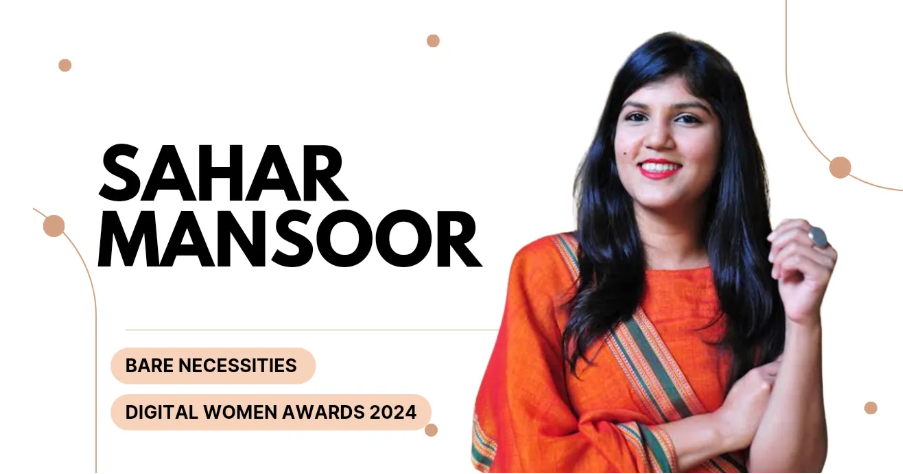Sahar Mansoor won the SheThePeople’s Digital Women Award 2024 in the Impact category. She talks to us about living a zero-waste lifestyle and founding her company Bare Necessities

Sahar Mansoor, founder and CEO of Bare Necessities, won SheThePeople’s Digital Women Award 2024 in the Impact category, for her dedicated work at a social enterprise that produces zero-waste personal and lifestyle products. Using a people-centred and earth-centred approach, Bare Necessities aims to leave behind zero packaging footprints.
In today’s age, we often raise concerns about the planet and the negative impact of human activities. Bare Necessities recognises the value of using ethically, logically, and naturally sourced ingredients to provide a holistic solution to the problem of waste through their zero-waste products, educational resources, and consulting services.
SheThePeople in conversation with Sahar Mansoor:
What roles do you play at Bare Necessities, and what drives you toward this goal?
I am the founder and CEO of Bare Necessities, India’s first B Corp-certified consumer brand dedicated to promoting a zero-waste ethos and sustainability through a circular economy lens. At Bare Necessities, we offer a wide range of sustainable, zero-waste personal care, lifestyle, and home care products, along with educational resources such as online sustainability courses, empowering individuals to adopt eco-friendly living practices.
How did you use digital platforms and tools to build your business?
In the latter half of 2019, as part of our people-centred and earth-centered approach to waste, we conceptualised and developed an online course on Zero-Waste Living. Following that, we added two more online courses—Building Blocks of Sustainability and Introduction to Circular Economy. We have also launched two e-books on kids’ activities and DIY ideas to go zero waste.
Currently, we have a customer retention rate of 60% in Bangalore (where we are based) and 50% outside of the city, across the rest of the country. We are also actively forming strategies for our consulting services, where the waste calculator will play a huge role in assessing our clients’ waste data. We already have a beta client for the waste calculator.
How do you envision your future with Bare Necessities?
According to a new survey by consulting firm Bain & Company, at least 60% of consumers in India are willing to pay a premium for sustainability products.
India currently ranks 43% in sustainability as a top-five key purchasing criterion. We target a growing middle- and upper-class market in the beauty and personal care sector, whose revenue amounts to $27.23 billion in 2023.
What does your business model look like?
Revenue for products is generated through B2B and B2C sales, with a current split of 20% B2B and 80% B2C. Our B2C markets, including our website, Amazon, and other online stores, are driving our growth alongside promotion through social media and other marketing channels.
We are also expanding the number of B2B stores we sell from. We now operate in almost 50 stores across 10 states in India, which has allowed our products to reach a broader market. These stores align with our vision, and we’ve sold 31,160 units to customers in the first three years of operation. Bare Necessities’ revenue streams include online marketplaces, B2B sales, and our website.
Can you share the funding you started your business with?
We have raised total funding of INR 2.3 crore to build this venture that promotes the idea of zero waste.
What are the key challenges you faced in this journey?
I think being an entrepreneur is extremely rewarding, but the road is often filled with challenges. There are always naysayers, and it takes a certain resilience to persist. Personally, these are some of the challenges I faced:
They told me that with all my learning disabilities, I wouldn’t achieve academic success in the traditional sense. They said that, as the daughter of a single mom, I could never afford the education of my dreams at Cambridge. They claimed I couldn’t start my own business in India without my father’s money or venture capital funding.
But humans are made of resilient stuff. Don’t let anyone tell you what you can or cannot do. Be bold in your imagination and create a vivid and beautiful life for yourself. After all, we are the authors of our own stories. We can physically, emotionally, and mentally heal from anything and defy all socially constructed notions of what our lives should look like.
Being a woman entrepreneur also enables me to harness my values to overcome these barriers. Raised by a single mother, I wanted to create an enterprise that empowers women. I’m very proud to say we are (almost) entirely a women-run enterprise!
Article Credit: shethepeople